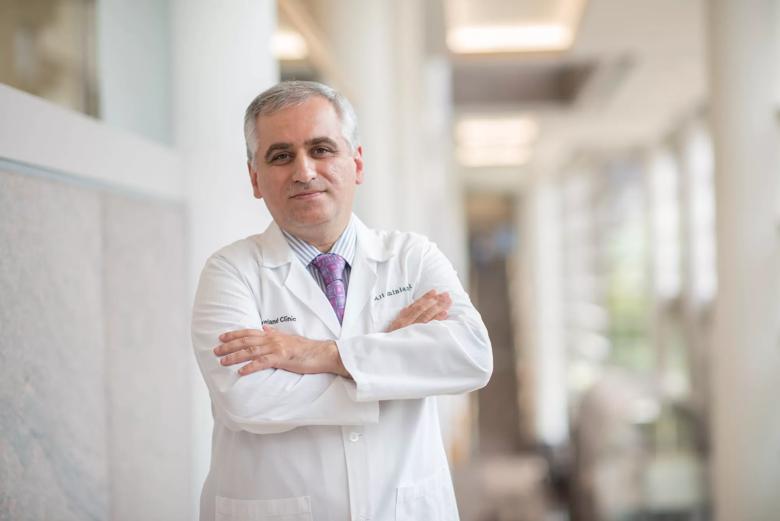Positive effects of metabolic surgery may be independent of weight loss
Content is property of Cleveland Clinic and for news media use only.

A Cleveland Clinic study shows that 5 to 10 percent of surgically induced weight loss is associated with improved life expectancy and cardiovascular health. In comparison, about 20 percent weight loss is necessary to observe similar benefits with a non-surgical treatment. The findings also show that metabolic surgery may contribute health benefits that are independent of weight loss. The study is published in the October issue of Annals of Surgery.

Image content: This image is available to view online.
View image online (https://assets.clevelandclinic.org/transform/bcdaefdf-0694-4143-aa54-85d9ab9dcbe0/Ali-Aminian-Photo-scaled_jpg)
Ali Aminian, M.D.
This large observational study looked at 7,201 Cleveland Clinic patients: 1,223 patients with obesity and type 2 diabetes who underwent metabolic surgery (bariatric or weight loss surgery) were matched to 5978 patients who received usual medical care. About 80 percent of the patients had hypertension, 74 percent had dyslipidemia (elevated triglycerides and cholesterol), and 31 percent were taking insulin to treat their diabetes.
Using different statistical models, the effects of weight loss were studied to identify the minimum weight loss needed to decrease the risk of death and of experiencing major adverse cardiovascular events, such as coronary artery events, cerebrovascular events, heart failure, kidney disease, and atrial fibrillation.
“Following metabolic surgery, the risk of death and major heart complications appears to decrease after about 5 percent and 10 percent weight loss, respectively. Whereas, in the nonsurgical group, both the risk of death and major cardiovascular complications decreased after losing approximately 20 percent of body weight,” said Ali Aminian, M.D., director of Cleveland Clinic’s Bariatric & Metabolic Institute, and lead author of the study.

Image content: This image is available to view online.
View image online (https://assets.clevelandclinic.org/transform/d16969f8-9baa-4d72-ae97-d2175631139e/nissen-steve-074-1024x683)
Ali Aminian, M.D.
“This study suggests greater heart disease benefits are achieved with less weight loss following metabolic surgery than medical weight loss using lifestyle interventions. The study findings suggest that there are important benefits of metabolic surgery independent of the weight loss achieved,” said Steven Nissen, M.D., Chief Academic Officer of the Heart, Vascular & Thoracic Institute at Cleveland Clinic, and the study’s senior author.
The groundbreaking STAMPEDE study showed metabolic surgery’s beneficial effects on blood glucose control. Since then, additional studies have observed health benefits other than weight loss following metabolic surgery. In fact, this research is a secondary analysis of a large study that showed weight-loss surgery is associated with a 40 percent reduction in risk of death and heart complications in patients with type 2 diabetes and obesity.
Researchers continue to study the physiological changes in the surgically modified gastrointestinal tract, the impact on hormone secretion and the microbiome. Those beneficial changes may contribute to the cardiovascular and survival benefits of metabolic surgery, independent of weight loss. More research is needed to better understand the underlying mechanisms for the health benefits of metabolic surgery in patients who have obesity and type 2 diabetes.
About Cleveland Clinic
Cleveland Clinic is a nonprofit multispecialty academic medical center that integrates clinical and hospital care with research and education. Located in Cleveland, Ohio, it was founded in 1921 by four renowned physicians with a vision of providing outstanding patient care based upon the principles of cooperation, compassion and innovation. Cleveland Clinic has pioneered many medical breakthroughs, including coronary artery bypass surgery and the first face transplant in the United States. U.S. News & World Report consistently names Cleveland Clinic as one of the nation’s best hospitals in its annual “America’s Best Hospitals” survey. Among Cleveland Clinic’s 67,554 employees worldwide are more than 4,520 salaried physicians and researchers, and 17,000 registered nurses and advanced practice providers, representing 140 medical specialties and subspecialties. Cleveland Clinic is a 6,026-bed health system that includes a 165-acre main campus near downtown Cleveland, 18 hospitals, more than 220 outpatient facilities, and locations in southeast Florida; Las Vegas, Nevada; Toronto, Canada; Abu Dhabi, UAE; and London, England. In 2019, there were 9.8 million total outpatient visits, 309,000 hospital admissions and observations, and 255,000 surgical cases throughout Cleveland Clinic’s health system. Patients came for treatment from every state and 185 countries. Visit us at clevelandclinic.org. Follow us at twitter.com/CCforMedia and twitter.com/ClevelandClinic. News and resources available at newsroom.clevelandclinic.org.
Editor’s Note: Cleveland Clinic News Service is available to provide broadcast-quality interviews and B-roll upon request.